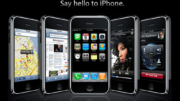GPS has been with us long enough that it’s almost possible to forget what life was life without it. It’s become more of a boogey-man story we tell to the youngsters: “In my day, we didn’t know where we were unless we had maps. We had to memorize addresses.” Today, you carry with you a radio sensitive enough to know where you are, almost to the foot.
if you’re curious about the way GPS works, you can check out this article I wrote a while back. It turns out that GPS cleverly combines some ancient trigonometry with modern satellite tech. Add an internet connection or some stored maps on your device and GPS can tell where you are in three dimensions at practically any time.
That’s right, practically any time.
GPS isn’t always there for you. You can lose the GPS signal in heavy cloud cover or during storms. Now, these are the times you really kind of need to rely on knowing where to go, so losing GPS is kind of a bummer in cases like that. You can also lose GPS if you’re down in the basement of a building, or any time the signal can’t get through some sort of obstruction.
That’s why there are several kinds of assisted GPS systems available, depending on where you are and what you’re connected to. The goal of aGPS is to make sure your location is available when it’s needed. It’s not just so you can find your way home. It’s also so the authorities can find you when you call for help.
Types of aGPS systems
There are three different kinds of aGPS systems. One isn’t used much anymore, but the other two are critical.
Rarely seen anymore: Gyroscopic assistance
In the early days of nav systems for cars, you’d pay $1,000 for GPS to be built into your dashboard. This was in the days when a decent GPS unit was about $150. The reason was that the in-dash nav wasn’t just a GPS unit. It also had gyroscopes and a compass of its own. The idea was that if you lose the GPS signal, you could rely on these gyroscopes to help you with directions until the signal came back. Gyroscopes aren’t very accurate in the long term and the compasses used in moving vehicles can drift. But it’s enough to keep you going for an hour or two with no problem.
This kind of aGPS is still seen on planes, but it’s rare in cars. People didn’t want to pay extra for a fancy nav system, so newer cars rely on systems like Android Auto and CarPlay more often. Even cars with their own nav systems tend to simply use other forms of aGPS.
Very common: cellular assistance
Your cell phone has several different kinds of radio receivers within it. There are radios for up to seven bands of cell service, GPS receivers, networking, and occasionally there’s even an FM radio chip in there, although it’s rarely turned on in the USA.
Simple math can let your cell carrier figure out your location within several feet. It’s not as precise as GPS and it’s not generally able to give elevation information like GPS. But, it’s enough to help the authorities find you if Buckler’s friend Fat Tony locks you in his trunk for nonpayment of gambling debts.
All cell phones provide location information through cell towers. The law requires it. Without that location, the whole system breaks down. Generally the combination of cell information and GPS lets the authorities know precisely where you are, so you can be less worried about Fat Tony.
Just as common: internet assistance
Your Wi-Fi signal can identify your location, too. If connect to Wi-Fi, the central network office knows which router provided that connection, and that gives your location within about 50 feet. If you don’t believe me, go to https://whatismyipaddress.com/ and it will tell you where you are. It’s not very precise but it tends to work well enough. When you’re on Wi-Fi you’re not likely to be moving, and if you are moving, that Wi-Fi system is probably using a cellular router so, it still knows where you are.
Assisted GPS is a great thing
Using aGPS helps you find your way home, helps others find you in an emergency, and keeps the whole world running as it should. Really the only people who don’t care for it are scofflaws like the Fat Tonys of the world.
Oh by the way, if you’re looking for a new phone or even a standalone GPS unit, you’ll find everything you need when you call the experts at Solid Signal. Call 888-233-7563 and you’ll reach an expert in our corporate offices outside Detroit. We’re here to get you going in the right direction!





